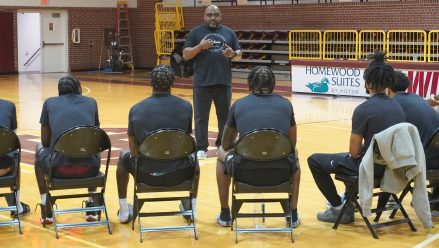Sara Slane was the virtual ambassador of legal sports betting in the United States less than a decade ago.
As the senior vice president of public affairs with the American Gaming Association (AGA), she was familiar in state houses and professional sports league offices, helping the trade group explain and mold what has become a $500 billion industry since the Supreme Court nullified the Professional and Amateur Sports Protection Act in 2018.
It would be interesting to know what 2017 Sara Slane would think of her 2025 pivot to evangelizing for prediction markets as head of corporate development at Kalshi. The company’s ascendance threatens the profitability — if not the existence, some contend — of the industry to which she dedicated so much of her working life. It’s not a question she cares to consider.
This, she said, is just what’s next, not only for sports but the political and pop culture contracts available on prediction markets like Kalshi, Sporttrade, and Polymarket.
“It’s just a transition period. I think it’s the next evolution for the industry, for financial markets,” she told InGame. “We can wrap ourselves around the axle around betting and sports betting and everything else, but I think it’s a progression and an adjacency. And I think, having seen how growth works and how it can benefit the industry, I think that Kalshi is an interesting platform.”
More acceptance of prediction markets
Slane began her career in the gambling industry as vice president of regional government affairs for MGM Resorts before joining the AGA. She later started a consultancy firm and took on Kalshi as a client in February before joining the company in April. Her role there is much the same as with the AGA in terms of “educating,” she said, professional sports leagues, media, and state-level politicians.
“I think we’re making some progress,” Slane contended. “There were a lot of allegations in the beginning that we weren’t regulated, which was obviously … just very misinformed. [I’m] trying to tell the story about Kalshi, but also trying to drive development with interested parties that would want to work with Kalshi.”
Slane said she’s having many of the same conversations now as in 2018. But seven years of mobile sports betting in the U.S. has at least fostered some acceptance of the industry.
“It’s very clear-cut who the adversaries are, which, honestly, hasn’t changed since I’ve been in gaming,” she said. “It’s brick-and-mortar operators that want to protect what they have and what they’ve built. It’s state regulators who want to protect their taxing and regulatory platforms. And so it’s not like terribly different.
“It’s sort of crazy to think that gaming was one of the last industries to pivot to online, and there still is a fighting of that. You see that playing out right now when it comes to online gambling, and that’s been going on since I’ve been in the industry, in 2007. It’s like literally nothing changes. It’s like Groundhog Day all over again. It’s the same people that are opposed.”
But now, she noted, stakeholders like pro sports leagues that have embraced sports betting as a new revenue stream — albeit with the enhanced scrutiny of a constant drip of gambling scandals — are at least onboard with online gambling. Reservations remain about prediction markets, however.
“The sky hasn’t fallen. Things are trending nicely,” Slane said. “I say this sometimes when the scandals come to light: ‘Fortunately and unfortunately, the system’s working.’ It’s sussing out when bad things are happening, and unfortunately bad things are happening.
“I think, all in all, it’s been a win for the industry. I think it’s been a win for the leagues. It’s obviously been a winner for consumers because they were doing it an illegal way and now it’s a legal, regulated way. And that’s not dissimilar from Kalshi.”
Slane said that Kalshi surveys indicate that most of the company’s new customers come from illegal sports betting markets.
Prediction markets the new disruptors
Slane said she hasn’t experienced negative interactions from industry peers who are suddenly on the other side of what Kalshi critics consider an existential issue for the gambling business. That side of the debate, she said, shouldn’t be represented by “five people who consistently are on LinkedIn and they make a job out of this.”
Prediction markets remain a target of state gambling authorities that argue they are unregulated and untaxed gambling operations. Kalshi contends it’s regulated on the federal level by the Commodity Futures Trading Commission (CFTC) and has successfully fended off numerous cease-and-desist orders.
Slane disagreed with the notion that her work could undermine a legal sports betting industry she helped lobby into existence.
“I just don’t look at it that way,” she countered. “I think that is a very short-sighted way of looking at the world and I think that competition is a good thing.
“It’s good for consumers. It’s good for the evolution of technology.”
Sports betting companies are acting as if they are preparing for either an evolution or a revolution. DraftKings has reportedly discussed the possibility of acquiring Railbird Exchange, which this year was certified by the CFTC as a designated contract market. Offshore prediction market Polymarket acquired little-known exchange QCEX and plans to launch in the United States under CFTC purview. Kalshi was reported to have had talks with FanDuel about a partnership.
“Anytime that anybody’s making money or they see success, you better get ready, that you’re going to have a competitor,” Slane said. “That’s just the way it is and we are all for it. We welcome the competition, but we want a level playing field. We’ve gone about things the right way. We went through the regulatory process. Everyone should go through the regulatory process and have to adhere to the same rules by which we have to adhere.”
Slane would not comment specifically about FanDuel, but said “we’ve talked to everybody as every other operator has said.”







